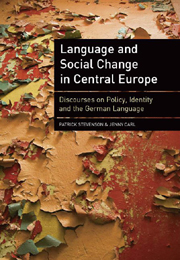Book contents
- Frontmatter
- Contents
- Acknowledgements
- List of Tables
- Transcription Conventions
- Map of Central Europe
- 1 Introduction
- 2 Discourses on Language in Social Life: Theoretical and Methodological Orientations
- 3 Sociolinguistic Histories and the Footprint of German in Eastern Central Europe
- 4 Language Policy Discourses: Interventions and Intersections
- 5 Language (Auto)biographies: Narrating Multilingual Selves
- 6 Language Ideologies: Negotiating Linguistic Identities
- 7 Conclusions
- Appendix A European Institutions and Documents Concerning Language Policy
- Appendix B Preamble to the European Charter for Regional or Minority Languages
- Appendix C Introduction to the 2005 Commission Communication ‘A New Framework Strategy for Multilingualism’
- Appendix D Introduction to the 2008 Commission Communication ‘Multilingualism: an asset for Europe and a shared commitment’
- Appendix E German and Austrian agents and institutions in foreign cultural policy
- Appendix F Extract from ‘Auswärtige Kulturpolitik – Konzeption 2000’
- Appendix G Central focus – ‘Leitbild’ – of the Goethe-Institut
- Appendix H Austria's Auslandskulturkonzept NEU
- Appendix I Plattform Kultur Mitteleuropa – Platform Culture Central Europe
- Appendix J Extract from Austria kulturint – Tätigkeitsbericht 2002
- Appendix K Czech 2001 White Paper on Education
- Appendix L Czech 2004 Education Act
- Appendix M Extract from Czech Follow-up of Action Plan on Language Learning and Linguistic Diversity
- Appendix N Hungarian 1997 Directive Concerning the Education for National and Ethnic Minorities
- Appendix O Extract from 2007 Hungarian National Core Curriculum
- Appendix P Extract from Hungarian Follow-up of Action Plan for Language Learning and Linguistic Diversity
- References
- Index
Appendix F - Extract from ‘Auswärtige Kulturpolitik – Konzeption 2000’
Published online by Cambridge University Press: 05 February 2013
- Frontmatter
- Contents
- Acknowledgements
- List of Tables
- Transcription Conventions
- Map of Central Europe
- 1 Introduction
- 2 Discourses on Language in Social Life: Theoretical and Methodological Orientations
- 3 Sociolinguistic Histories and the Footprint of German in Eastern Central Europe
- 4 Language Policy Discourses: Interventions and Intersections
- 5 Language (Auto)biographies: Narrating Multilingual Selves
- 6 Language Ideologies: Negotiating Linguistic Identities
- 7 Conclusions
- Appendix A European Institutions and Documents Concerning Language Policy
- Appendix B Preamble to the European Charter for Regional or Minority Languages
- Appendix C Introduction to the 2005 Commission Communication ‘A New Framework Strategy for Multilingualism’
- Appendix D Introduction to the 2008 Commission Communication ‘Multilingualism: an asset for Europe and a shared commitment’
- Appendix E German and Austrian agents and institutions in foreign cultural policy
- Appendix F Extract from ‘Auswärtige Kulturpolitik – Konzeption 2000’
- Appendix G Central focus – ‘Leitbild’ – of the Goethe-Institut
- Appendix H Austria's Auslandskulturkonzept NEU
- Appendix I Plattform Kultur Mitteleuropa – Platform Culture Central Europe
- Appendix J Extract from Austria kulturint – Tätigkeitsbericht 2002
- Appendix K Czech 2001 White Paper on Education
- Appendix L Czech 2004 Education Act
- Appendix M Extract from Czech Follow-up of Action Plan on Language Learning and Linguistic Diversity
- Appendix N Hungarian 1997 Directive Concerning the Education for National and Ethnic Minorities
- Appendix O Extract from 2007 Hungarian National Core Curriculum
- Appendix P Extract from Hungarian Follow-up of Action Plan for Language Learning and Linguistic Diversity
- References
- Index
Summary
Ziele und Grundsätze der Auswärtigen Kulturpolitik
Die Auswärtige Kulturpolitik der Bundesregierung (AKP) orientiert sich an folgenden Zielen und Grundsätzen:
1. Die Auswärtige Kulturpolitik ist integraler Teil unserer Auβenpolitik. Sie ist an den allgemeinen Zielen und Interessen der deutschen Auβenpolitik – Sicherung des Friedens, Konfliktverhütung, Verwirklichung der Menschenrechte, partnerschaftliche Zusammenarbeit – ausgerichtet und unterstützt sie.
2. Unsere Kulturarbeit im Ausland ist nicht einfach neutral, sondern orientiert sich an Werten. In Fragen der Demokratieförderung, Verwirklichung der Menschenrechte, Nachhaltigkeit des Wachstums, Teilhabe am wissenschaftlich-technologischen Fortschritt, Armutsbekämpfung oder Schutz der natürlichen Ressourcen bezieht sie eindeutig Position.
3. Auswärtige Kulturpolitik vermittelt Kultur aus Deutschland als Teil der europäischen Kultur. Sie kennzeichnet Deutschland als Kulturstaat im Dialog mit der internationalen Gemeinschaft der Staaten. Auswärtige Kulturpolitik entfaltet sich auf der Basis der innerstaatlichen Kultur- und Bildungspolitik, wie sie von Bund, Ländern und Gemeinden sowie den privaten Trägerorganisationen gestaltet wird. Sie kann daher nicht wirksamer sein als diese. Auswärtige Kulturpolitik bezieht private Initiativen von Körperschaften und Bürgern ein (”public-private partnership“).
4. Auswärtige Kulturpolitik beschränkt sich jedoch nicht aufKulturvermittlung, sondern fördert Dialog, Austausch und Zusammenarbeit zwischen Menschen und Kulturen. Sie dient der zwischenstaatlichen und zwischenmenschlichen Verständigung, setzt sich für Weltoffenheit und Weltläufigkeit ein und baut Glaubwürdigkeit, Verlässlichkeit und unverzichtbare Netzwerke für die politische und wirtschaftliche Zusammenarbeit auf- und zwar langfristig. Auswärtige Kulturpolitik gewinnt Partner und Freunde für Deutschland und fördert so unmittelbar vitale Interessen unseres Landes.
- Type
- Chapter
- Information
- Language and Social Change in Central EuropeDiscourses on Policy, Identity and the German Language, pp. 222 - 224Publisher: Edinburgh University PressPrint publication year: 2010

